The FBI used administrative maneuvers to stonewall investigative activity surrounding Ukraine and Hunter Biden’s ties to Ukrainian energy firm Burisma Holdings, former U.S. Attorney for the Western District of Pennsylvania Scott Brady testified to the House Judiciary Committee.
FBI headquarters allegedly micromanaged the investigative process to slow-walk Brady’s attempt at vetting information related to corruption in Ukraine and Hunter Biden’s business relationship with Burisma, resulting in significant delays to vetting activity assigned to Brady by then-Attorney General Bill Barr, according to a transcript of his testimony reviewed by the Daily Caller. (RELATED: Top Hunter Biden Prosecutor David Weiss, FBI ‘Constricted’ Internal Communications, Testimony Shows)
“I think there was reluctance on the part of the FBI to really do any tasking related to our assignment from DAG Rosen and looking into allegations of Ukrainian corruption broadly and then specifically anything that intersected with Hunter Biden and his role in Burisma. It was very challenging,” Brady stated.
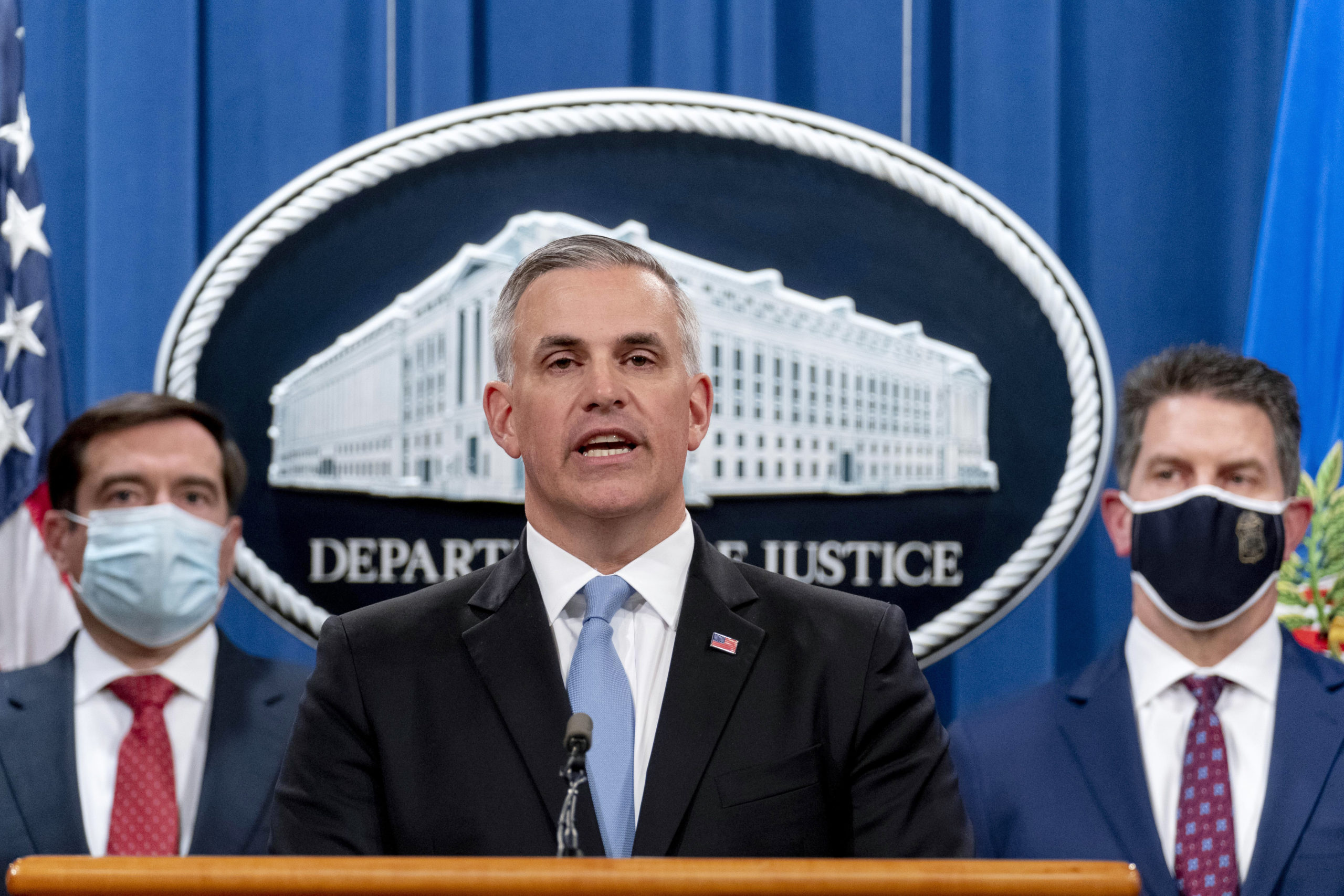
WASHINGTON, DC – OCTOBER 19: U.S. Attorney for the Western District of Pennsylvania Scott Brady, center, accompanied by Assistant Attorney General for the National Security Division John Demers, left, and FBI Deputy Director David Bowdich right, speaks at a news conference at the Department of Justice, on October 19, 2020 in Washington, DC. The Justice Department announced an indictment against six Russia GRU officers charged with engaging in a series of hacking and malware deployment operations to attack other countries’ infrastructure, elections and other actions designed to further Russia’s interests. (Photo by Andrew Harnik – Pool/Getty Images)
“I know that, because of what they deemed to be the sensitive nature, and this was sensitive, as it related to Mr. Biden, that there were a lot of steps of approval and a lot of eyes that had to look at things and sign off on any action that the special agents that were doing the day-to-day work and interacting with our team would take,” Brady added, according to a transcript of his testimony reviewed by the Daily Caller.
Brady described specific administrative measures taken by the FBI to allegedly delay approval of investigative steps and prevent agents from working on the vetting process for weeks at a time. (RELATED: House Oversight Investigating Whether Joe Biden Held Classified Documents Related To Hunter Biden’s Business Dealings)
“Even something as simple as extending the assessment that we talked about, that requires a renewal every 30 days under the FBI DIOG. Normally that, either opening or renewal, can be by — at the SSA level. In this case, it required 17 different people, including mostly at the headquarters level to sign off on it before the assessment could be extended,” Brady explained.
“And so, at different times, we were told by the special agents that they had to go pens down sometimes for 2 or 3 weeks at a time before they could re-engage and take additional steps because they were still waiting on, again, someone within the chain signoff to approve,” Brady added, according to a transcript of his testimony reviewed by the Daily Caller.
He said he had never seen a 17 person approval process required by the FBI for investigative activity. When he had issues with the FBI, Brady would go to the Principal Associate Deputy Attorney General (PADAG) and then-FBI Deputy Director David Bowdich to resolve the problem.
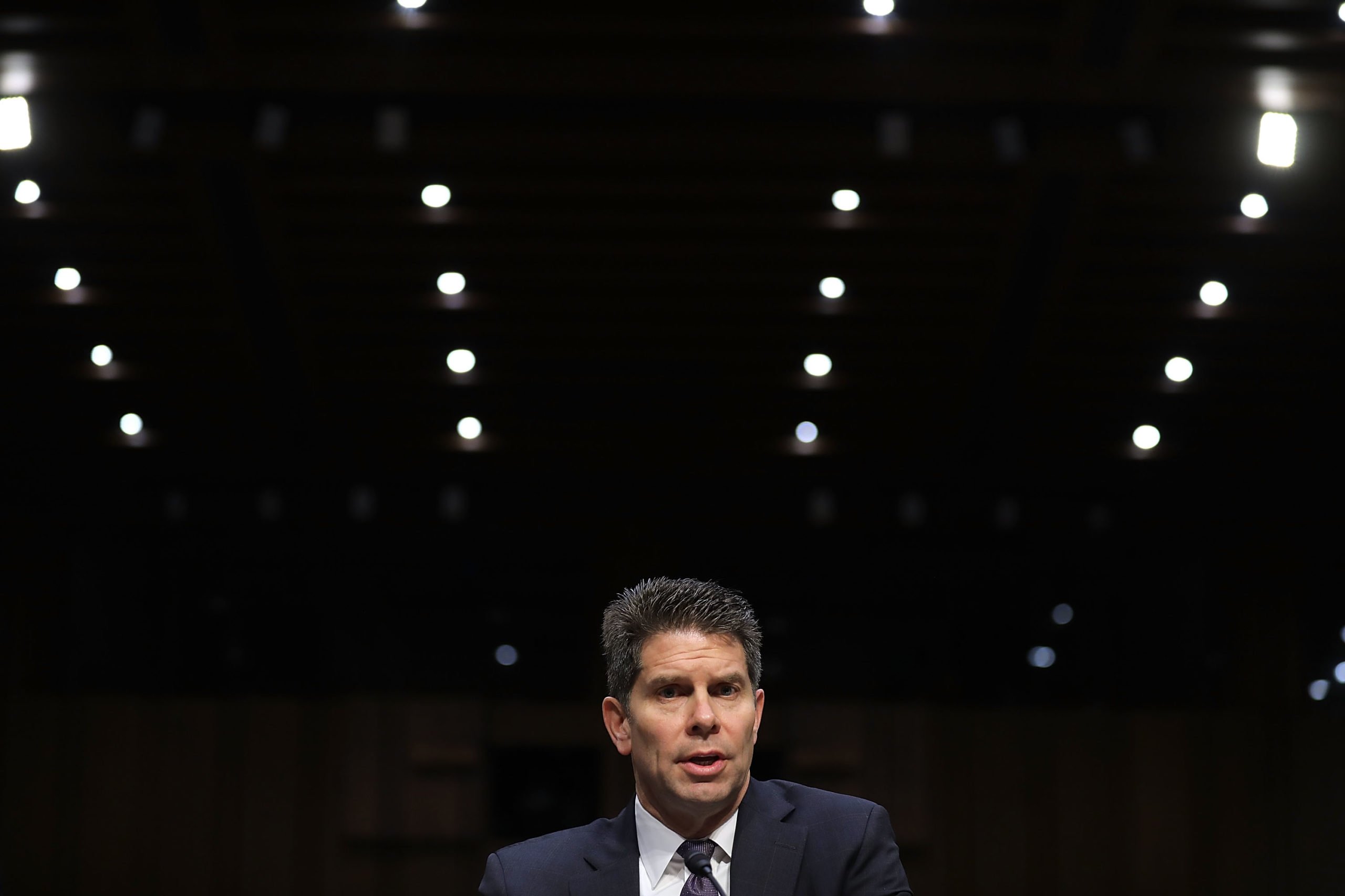
WASHINGTON, DC – MARCH 14: Acting Deputy Director of the Federal Bureau of Investigation David Bowdich testifies before the Senate Judiciary Committee during a hearing about the massacre at Marjorie Stoneman Douglas High School in the Hart Senate Office Building on Capitol Hill March 14, 2018 in Washington, DC.Bowdich testified that the FBI could have and should have done more to stop the school shooter Nikolas Cruz after it receieved several tips about him. (Photo by Chip Somodevilla/Getty Images)
Brady described how the problems with the FBI were coming from the headquarters, not the Pittsburgh field office. He did not know who the “choke point” was inside the FBI.
“So usually the issues were not at the Pittsburgh Field Office, including the ASACs or SAC levels. It was somewhere at FBI headquarters, and I had no visibility into where that choke point was,” Brady testified.
“It meant, as I stated earlier, there were a lot of stops and starts,” he said.
“Even the process by which the FBI categorized the opening of the assignment — as I said, they have their administrative procedures that are governed by the DIOG. We could simply open a matter and then move forward.”
“And, for a period, they were pens down and not able to do anything until it was both approved as an assessment and then signed off on. And then, again, it required every 30 days a renewal. And so there were several times, because of the sign-offs required, where the agents would go pens down for weeks at a time. And so that was incredibly frustrating,” Brady reiterated, according to a transcript of his testimony reviewed by the Daily Caller.
He was referring to his assessment of the credibility information he received on Ukraine. Barr instructed him to coordinate with the FBI and other intelligence agencies to determine the credibility of the information and whether it warranted further investigation.
Brady confirmed during his testimony that Ukraine related information from former Trump attorney Rudy Giuliani was not the source for an FBI FD-1023 form containing allegations Ukrainian oligarch and Burisma founder Mykola Zlochevsky bragged about bribing Joe and Hunter Biden with $5 million each. The bribery allegations were supplied to the FBI by a confidential human source with prior experience working for the FBI. (RELATED: Biden Bribery Allegations Came From Credible FBI Source Used In Other Investigations, Former Prosecutor Confirms)
The FBI delays became less frequent around June 2020 after the Pittsburgh field office hired a new special agent in charge to run the office.
“Once that SAC got in place, then things got moving, and the relationship was much, much better. However, though, there was still interaction with headquarters and sign-off required by headquarters,” Brady stated.
“So, in that last period, once the new SAC came on board, it was much better and we could get things moving. So, really, from January until, again, end of May, it was incredibly challenging and we did not make much progress at all,” Brady added, according to a transcript of his testimony reviewed by the Daily Caller.
He received an assignment from Barr in January 2020 to vet information about Ukraine coming to the Department of Justice, including the information from Giuliani. The assignment was given to him by then-PADAG Seth DuCharme on behalf of Barr and then-Deputy Attorney General Jeffrey Rosen.
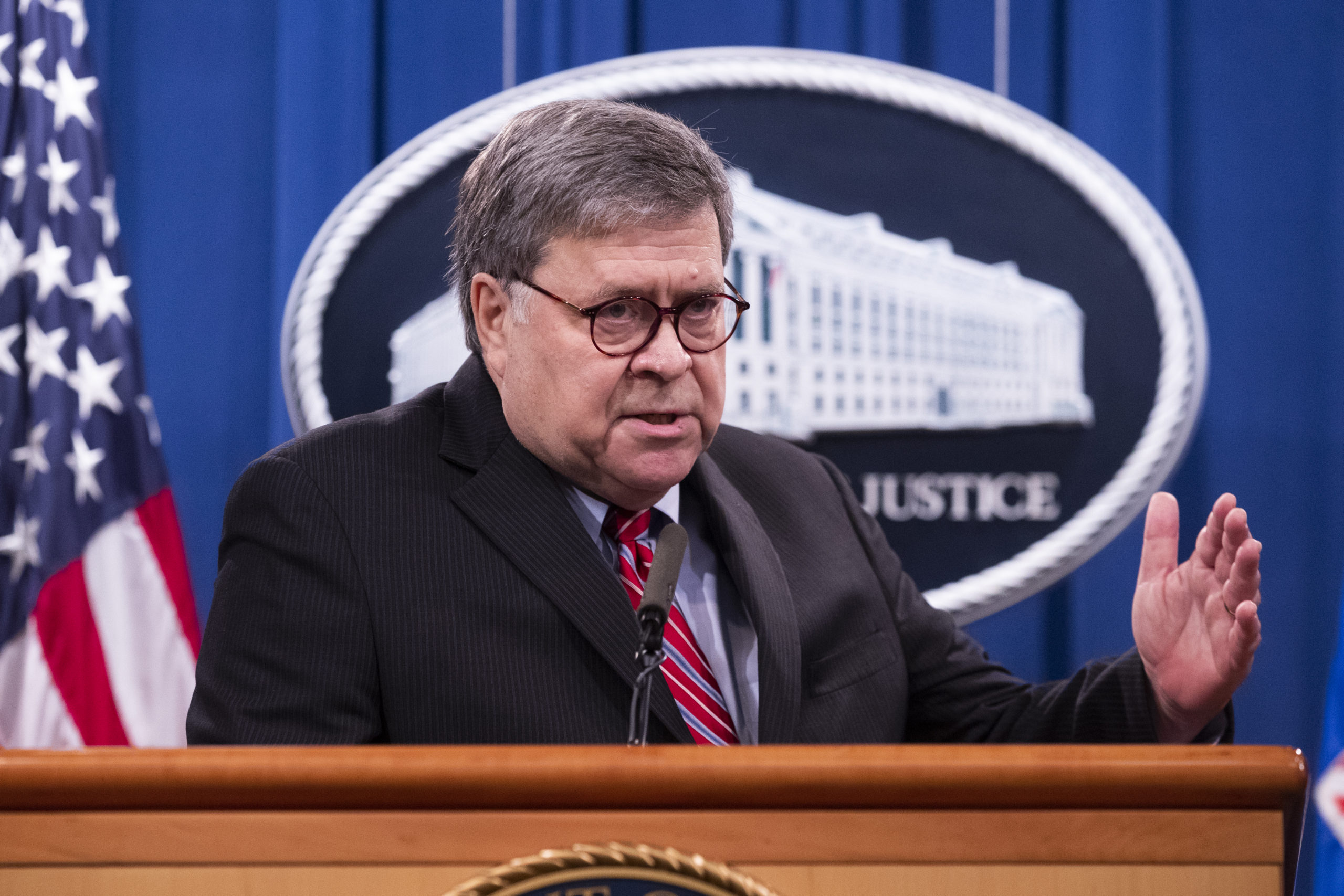
WASHINGTON, DC – DECEMBER 21: US Attorney General Bill Barr holds a news conference to provide an update on the investigation of the terrorist bombing of Pan Am flight 103 on the 32nd anniversary of the attack, at the Department of Justice December 21, 2020 in Washington, DC. Barr announced criminal charges against one of the alleged Libyan bombmakers. The bombing occurred on December 21, 1988, killing all 259 people on board and eleven on the ground in Lockerbie, Scotland. (Photo by Michael Reynolds-Pool/Getty Images)
Brady assembled a bipartisan legal team of investigators to handle Ukraine matters, including two assistant U.S. attorneys who worked on Ukraine full time, he testified. His office’s legal authority was limited because he did not have grand jury tools such as sending subpoenas for documents and witnesses.
“We did not have a grand jury. We did not have the tools available to us that a grand jury would have, so we couldn’t compel testimony. We couldn’t subpoena bank records,” Brady said.
“But we were to assess the credibility of information, and anything that we felt was credible or had indicia of credibility, we were then to provide to the offices that had predicated grand jury investigations that were ongoing,” he added, according to a transcript of his testimony reviewed by the Daily Caller.
His team worked with the FBI on the vetting process by running names through existing files and evaluating open source information. Once he made his assessment, he would brief U.S. attorneys on the information that required additional investigation with grand jury tools.
“So our interface was U.S. attorney’s office to U.S. attorney’s Office. So specifically, I’m talking about Delaware, EDNY, SDNY,” Brady said. The Delaware U.S. Attorney’s office, lead by Delaware U.S. Attorney David Weiss, took the lead in the Hunter Biden investigation by the Department of Justice (DOJ).
Brady briefed Weiss’ office in October 2020 on the details of the FD-1023 form with the bribery allegations and he believed the document was credible enough to warrant further investigation.
“But, concerning this particular assignment by DAG Rosen relating to Ukraine, we had several conversations and interactions, both between David and me and then between our respective teams that were running our — vetting on our side, investigation on their side relating to the sharing of information from, you know, January, let’s say, 10th through mid to late October when we provided the final briefing to the District of Delaware,” Brady testified.
“I’m not sure what you mean by a lot of information, but we gave a substantive briefing with the information, including the 1023 that we thought would be of interest to them or that they should investigate further, and made other recommendations about possible investigative avenues that we would recommend that they take,” Brady added, according to a transcript of his testimony reviewed by the Daily Caller.
READ THE LETTER:
Similar information was provided by Republican Iowa Sen. Chuck Grassley in a Tuesday letter to Attorney General Merrick Garland and FBI Director Christopher Wray. (RELATED: FBI Received ‘Criminal Information’ On Joe And Hunter Biden From Over 40 Confidential Sources, Sen Grassley Finds)
Grassley described how the FBI undermined its own confidential human sources by classifying their Ukraine related intelligence as “disinformation” which allowed the FBI headquarters to halt investigative activity. The FBI had more than 40 confidential human sources investigating “criminal information” surrounding Joe Biden, Hunter Biden and James Biden, Grassley found.
Grassley cited an assessment in August 2020 by FBI agent Brian Auten allegedly used by FBI headquarters to falsely discredit information from confidential human sources on Biden family matters. Brady had no awareness of the Auten assessment or Hunter Biden’s laptop archive until he saw public reporting about them.
“This was never shared with me by the FBI, but there was many things. I was not aware of that the FBI was in possession of the Hunter Biden laptop. There were many things that were not shared back with the Pittsburgh Office,” Brady said, according to a transcript of his testimony reviewed by the Daily Caller.
“I would have thought that would be something, especially as has been publicly reported, there’s information relating to Hunter Biden’s activities on the board of Burisma in Ukraine, that might have been helpful in our assessment of the information that we were receiving about him,” Brady added, referring to the laptop.
“I would have expected that be shared. However, not knowing the source, now I know the source. But, you know, if it had been grand jury derived or subpoenaed or seized as a result of a search warrant, that wouldn’t surprise me it wouldn’t be shared with us. But, yeah, we were all surprised.”
Brady specifically described how the FBI headquarters did not share the Auten assessment with him because they had separate workflows.
“Only what was public and broad brushstrokes there was an assessment, that Mr. Auten identified all of the information relating to allegations of corruption, of, you know, Hunter Biden and Ukraine and Burisma to be not credible and/or sourced by Russian mis- or disinformation, and that assessment was closed. That’s all I know,” Brady recalled.
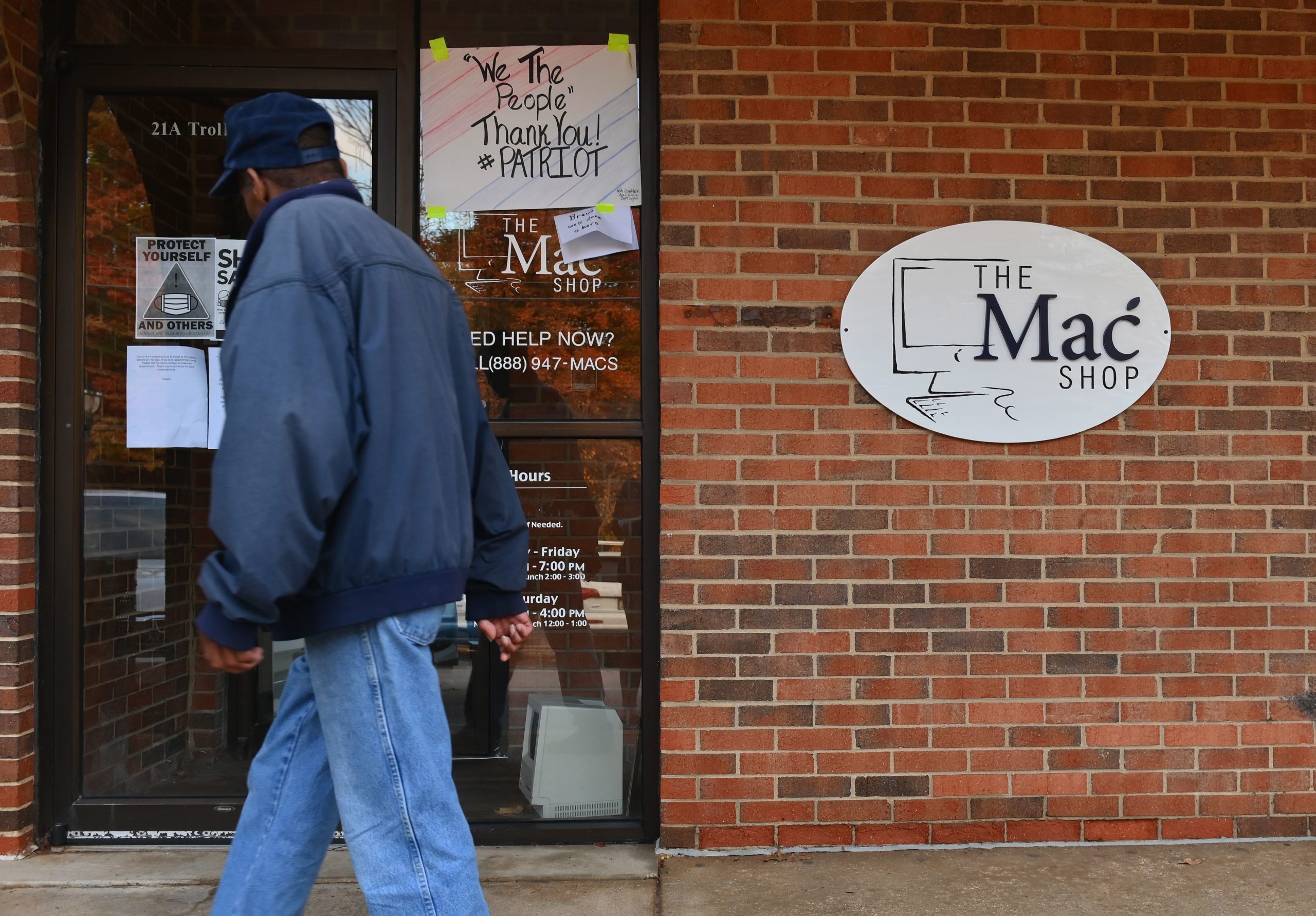
A man walks past “The Mac Shop” in Wilmington, Delaware on October 21, 2020. – The New York Post last week revived allegations against Hunter Biden with a story claiming it had obtained documents from a laptop owned by the former vice president’s son which was brought in for repairs to the shop in April 2019 but never picked up. The Post claimed that emails found on the laptop showed that Hunter Biden introduced his father to a Burisma advisor, Vadym Pozharskyi, in 2015 and contradict Joe Biden’s claims that he never spoke to his son about his overseas business dealings. The Post said the shop owner handed the laptop over to the FBI and also made a copy of the hard drive and gave it to former New York mayor Rudy Giuliani. (Photo by Angela Weiss / AFP) (Photo by ANGELA WEISS/AFP via Getty Images)
“I don’t know if information that came through the Pittsburgh Office as a part of this vetting process was included in that, excluded from that. I don’t know,” Brady continued. He received multiple follow up questions related to the Auten assessment.
“Separate work streams. We had no visibility into what headquarters was doing. They did not share with us. They were only watching and approving our investigative steps that we requested,” he said.
“Not necessarily surprised an assessment would be conducted, but knowing so little about it, the genesis the scope of it, I would have thought — I would expect that if it intersected with what we were doing, that someone would have talked to us. Now, maybe that was just headquarters to FBI Pittsburgh conversation. But I would have thought that we would be read into or be a part of that conversation,” Brady added, according to a transcript of his testimony reviewed by the Daily Caller.
Further, people inside the FBI appeared to spread false information to senior FBI and DOJ leadership, which required Brady to issue corrections internally to clarify what his office was working on.
“And, without disclosing privileged communications, there were representations made to senior leadership of the FBI about what we were doing or not doing that were not true that we had to correct, both internally at DOJ, with ODAG, and General Barr, and then subsequently with the Director and Deputy Director, but we resolved that. But there was information that was being shared up that chain at the FBI that was incorrect,” Brady asserted.
Hunter Biden received more than $80,000 per month from Burisma as a board member of the company despite his lack of experience in the energy sector and Ukraine, according to bank records released by the House Oversight Committee.
In total, the Biden family and its business associates hauled in more than $24 million from Ukraine, Russia, China, Romania and Kazakhstan, according to a House memo circulated prior to the first impeachment hearing into President Biden.
The $24 million figure came from suspicious activity reports sent by banks to the Treasury Department, House Oversight Committee Chairman James Comer said during the hearing. He subpoenaed Hunter Biden and his uncle James Biden’s personal and business bank records after the hearing concluded. (RELATED: White House Defense Of James Biden’s $200,000 Payment To Joe Biden Not Backed Up By Bank Records, James Comer Says)
Hunter Biden’s former business associate and former Burisma board member Devon Archer testified to the Oversight Committee in July and recalled Joe Biden speaking to his son’s foreign business associates on roughly 20 occasions.
Archer said that Joe Biden attended a spring 2014 dinner with Russian oligarch Elena Baturina and a spring 2015 dinner with Burisma executive Vadim Pozharskyi.
An email on Hunter Biden’s abandoned laptop archive from April 2015 appears to confirm Pozharskyi enthusiastically met Joe Biden the night before. (RELATED: Here’s All The Evidence Connecting Joe Biden To Hunter Biden’s Foreign Business Dealings)
Archer also said the Biden family “brand” protected Burisma from scrutiny and he recalled an instance where Hunter Biden “called D.C.” because of pressure from Zlochevsky and Pozharskyi. He was unable to confirm who was on the other end of Hunter Biden’s phone call.
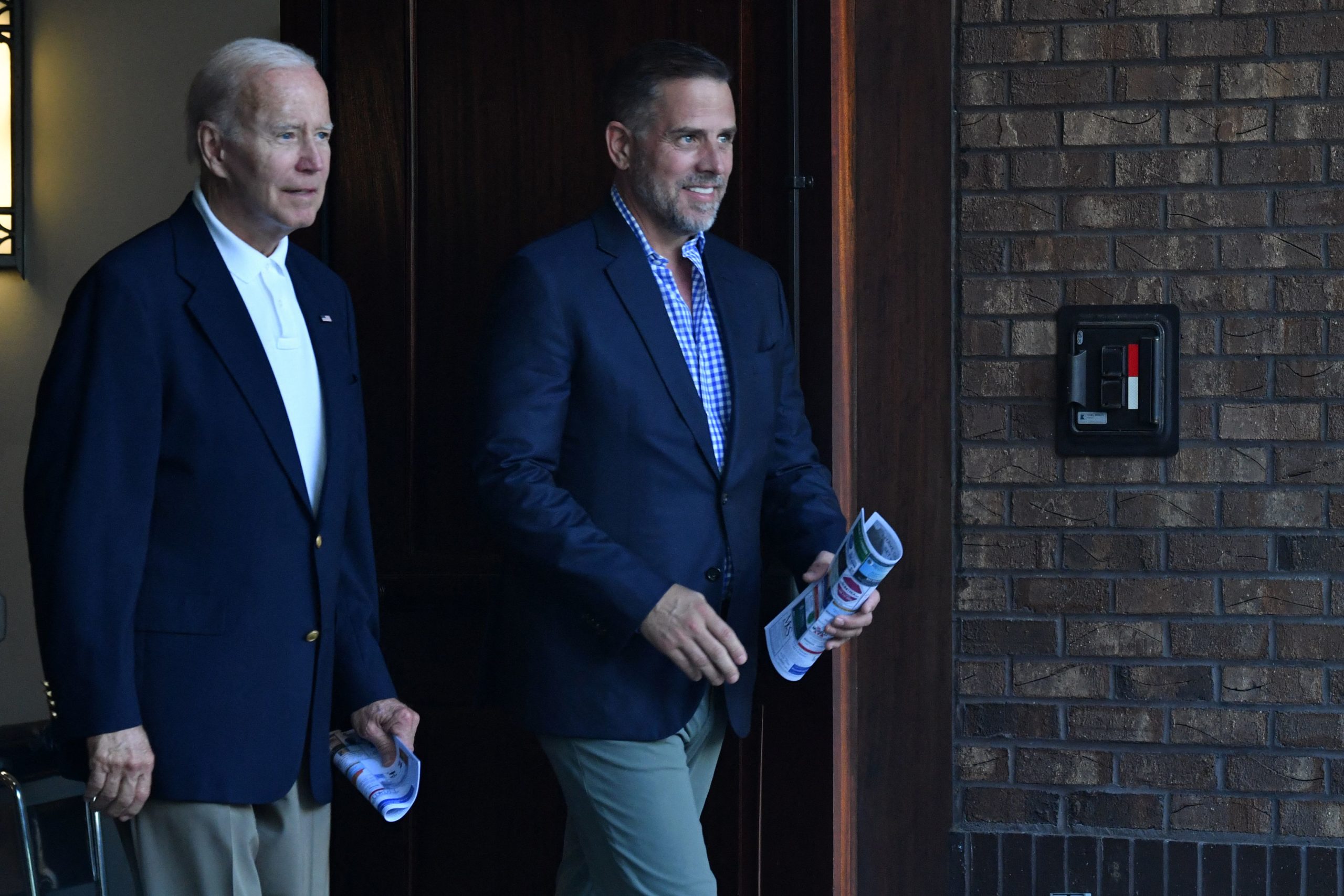
US President Joe Biden (L) alongside his son Hunter Biden exit Holy Spirit Catholic Church after attending mass in Johns Island, South Carolina on August 13, 2022. (Photo by Nicholas Kamm / AFP) (Photo by NICHOLAS KAMM/AFP via Getty Images)
The Daily Caller News Foundation, New York Times, Washington Post and other media outlets have verified the contents of Biden’s laptop. Former Hunter Biden business associate Tony Bobulinski told the FBI ahead of the 2020 election that the New York Post’s reporting on the contents of Hunter Biden’s laptop was real, according to an FBI FD-302 interview summary.
Likewise, IRS whistleblower Gary Shapley testified to the House Ways and Means Committee about how the FBI verified the laptop’s authenticity as early as November 2019. The Ways and Means Committee released a trove of documents in September supporting the testimony from Shapley and IRS whistleblower Joseph Ziegler.
Hunter Biden is suing the IRS because of alleged illegal disclosures from Shapley and Ziegler in their Congressional testimony and media interviews. He is simultaneously suing computer repairman John Paul Mac Isaac, Giuliani and former Trump aide Garrett Ziegler for disseminating the laptop’s contents.
“The FBI’s investigative work is thorough, methodical, and rigorous. We follow the facts without regard for politics. Any information we receive must be verified, whether it is a tip provided by the a member of the public or information provided by a source,” the FBI told the Daily Caller in a statement.
“While other opinions and criticism often come with the job, we will continue to follow the facts wherever they lead, do things by the book, and speak through our work.”
Henry Rodgers contributed to this report.
